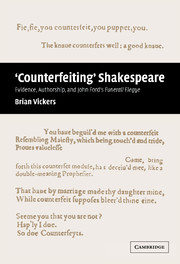Book contents
- Frontmatter
- Contents
- Preface
- List of tables
- List of abbreviations and note on references
- Prologue. Gary Taylor finds a poem
- PART I DONALD FOSTER'S ‘SHAKESPEAREAN’ CONSTRUCT
- 1 ‘W. S.’ and the Elegye for William Peter
- 2 Parallels? Plagiarisms?
- 3 Vocabulary and diction
- 4 Grammar: ‘the Shakespearean “who”’
- 5 Prosody, punctuation, pause patterns
- 6 Rhetoric: ‘the Shakespearean “hendiadys”’
- 7 Statistics and inference
- 8 A poem ‘indistinguishable from Shakespeare’?
- PART II JOHN FORD'S ‘FUNERALL ELEGYE’
- Epilogue. The politics of attribution
- APPENDICES
- Notes
- Bibliography
- Index
1 - ‘W. S.’ and the Elegye for William Peter
Published online by Cambridge University Press: 10 December 2009
- Frontmatter
- Contents
- Preface
- List of tables
- List of abbreviations and note on references
- Prologue. Gary Taylor finds a poem
- PART I DONALD FOSTER'S ‘SHAKESPEAREAN’ CONSTRUCT
- 1 ‘W. S.’ and the Elegye for William Peter
- 2 Parallels? Plagiarisms?
- 3 Vocabulary and diction
- 4 Grammar: ‘the Shakespearean “who”’
- 5 Prosody, punctuation, pause patterns
- 6 Rhetoric: ‘the Shakespearean “hendiadys”’
- 7 Statistics and inference
- 8 A poem ‘indistinguishable from Shakespeare’?
- PART II JOHN FORD'S ‘FUNERALL ELEGYE’
- Epilogue. The politics of attribution
- APPENDICES
- Notes
- Bibliography
- Index
Summary
In the critical reaction to Gary Taylor's claims for ‘Shall I die?’ the name of Donald Foster occurred several times, as the author of letters to the TLS and New York Times in 1986, and a longer essay for Shakespeare Quarterly in 1987. These contributions were well presented, citing lexical and other data which would date that poem to the Jacobean period, far later than Taylor's theory allowed. At this point Foster had published none of his work on the Funerall Elegye for William Peter (1612), and his interventions seemed like the work of a disinterested scholar, concerned to establish the truth. From Foster's recent autobiography, however, a quite different picture emerges. According to this colourful account, ‘the “Shakespeare” attribution for “Shall I die?” had been documented long ago in standard reference works’, and ‘though new to Stanley Wells and Gary Taylor, had long been known to other scholars …’, but without arousing interest. But it was no sooner published than ‘the academic establishment exploded into raucous laughter’, and the poem ‘was described … as the most ridiculous piece of rubbish produced in the seventeenth century’. Foster explains that, ‘neither good nor bad, probably a stage jig, “Shall I die?” was just one of several lyrics’ doubtfully ascribed to Shakespeare.
- Type
- Chapter
- Information
- 'Counterfeiting' ShakespeareEvidence, Authorship and John Ford's Funerall Elegye, pp. 57 - 79Publisher: Cambridge University PressPrint publication year: 2002



